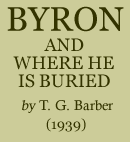< Previous | Contents | Next >
CHAPTER 12.
THE EXPERIMENT FAILS.
1816.
After Annabella’s departure, Byron was overcome by remorse, which was mitigated to some extent by the affectionate letters he received from her.
Upon arriving at Kirkby she wrote: —
Her parents were terribly shocked by her appearance, and she had to admit her unhappiness. At the same time she did her best to shield Byron, urging as an excuse for his strange behaviour a complete break-down in health. Sir Ralph and Lady Noel were at first sympathetic, and desired him to come to Kirkby, but as time went on they gradually learned the truth. Upon receiving a report from Dr. Baillie, who examined Byron under the cover of a visit for his liver complaint, that he could find no trace of insanity, Sir Ralph Milbanke wrote to his son-in-law telling him that his wife would not return.
Byron was dumbfounded and tried his utmost to arrange to meet Annabella with a view to reconciliation, but to no purpose. His friends, and amongst them that amazing person, Lady Caroline Lamb, did their best to heal the breach. They, however, were no more successful than he. Annabella, under the influence of her mother, who hated Byron, resolutely refused to renew their relations, and in consequence the attorneys of the two families proceeded to arrange a separation. Hobhouse took up the cudgels on behalf of his friend. “What,” he asked, “is Lord Byron charged with? No other charge could be laid against him but that he got up late, dined alone, was generally out of sorts and occasionally out of humour.”
Annabella’s legal adviser could not be moved. He had made up his mind that a reconciliation was impossible, and he stood firm on the point of a separation. In consequence a deed was prepared, problems of finance adjusted, all conditions set forth, and on April 21, 1816, Byron put his signature to it.
Another chapter in his life had closed, and with no credit to himself—or the other party concerned.
He had tried to escape from the haunting memories of his early romance, first by abandoning himself to a life of excitement, gaiety, and dissipation; and then by entering into a marriage of convenience at the instigation of his friends.
Both experiments had failed—and failed utterly.
What had the future in store for him? What was he to do? Annabella had gone! First one and then another had entered and passed out of his life. His thoughts drifted back into the past—five, ten, twelve, fourteen years. If only one who had entered his life, had never passed from it, how different everything might have been! But he had to take up his life again where it was —not where it might have been.
There was only one thing for him to do—one course for him to follow—it was the wisest and best—to leave England as quickly as possible. If he did not leave England of his own accord, his enemies were determined to drive him out. By his scornful attitude towards men generally, he had made many personal enemies; the hour of his calamity was their opportunity of attack. He was assailed as a traitor—a dangerous foe of religion, morality, and social order.
In the House of Lords no one spoke to him, and on his way to and fro he had to face the insults of the crowds. Gentlemen and ladies of society held aloof from him. He was attacked in the Press, and “in some of the journals compared to Nero, to Henry the Eighth, even to the devil himself!” His writings were ridiculed. They had been very much over-rated—in fact, they were nothing more than the scribblings of a third-rate rhymster. Nothing could stem the flood of hatred that had burst upon him.
He was not lacking in courage. He had entered the lists with his enemies before—he would enter them again if need be—he could more than hold his own. But if England did not want him, he would shake the dust of his native country from his feet. His only regret was that of leaving Augusta. She, of all his friends, had stood by him in the time of his calamity, but there was no alternative. He bade her a pathetic farewell, and after her departure sat down and wrote to Annabella. “More last words—not many—and such as you will attend to— answer I do not expect—nor does it import—but you will hear me. I have just parted from Augusta—almost the last being you had left me to part with .... Wherever I may go—and I am going far—you and I can never meet again in this world—nor in the next .... If any accident occurs to me—be kind to Augusta.”
On April 24, 1816, he left London, and Hobhouse and Scrope Davies made the journey to Dover with him.
At nine o’clock on the morning of April 25, with Fletcher, his valet, the boy Robert Rushton, a Swiss servant Berger, and a very affected little doctor named Pollidori, he sailed for Ostend.
The vessel moved slowly away from the jetty into a choppy sea. Byron, standing on deck, waved farewell to his friends. Hobhouse watched until the vessel passed out of sight, and then as he turned away he said to himself : “God bless him for a gallant spirit and a kind one! ”
